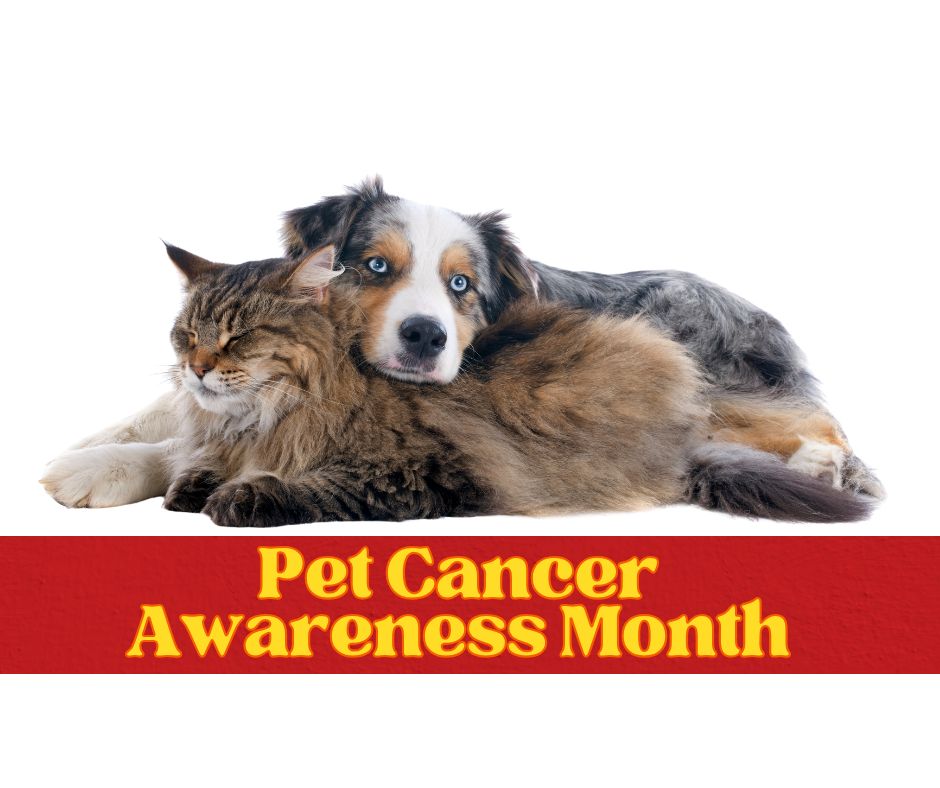Understanding, Preventing, and Supporting Our Pets’ Health
November is National Pet Cancer Awareness Month, a time to raise awareness about the impact of cancer on our beloved pets and to educate pet owners about prevention, early detection, and treatment options. While we often associate cancer with humans, it’s important to recognize that pets, especially dogs and cats, can also develop various types of cancer. As pet owners, knowing the signs and acting quickly can make all the difference in the outcome for our furry companions.
The Reality of Pet Cancer
Just like humans, pets can develop cancer at any stage of life, but the risk increases as they age. In fact, cancer is one of the leading causes of death in older dogs and cats. According to the American Veterinary Medical Association (AVMA), approximately 1 in 4 dogs and 1 in 5 cats will be diagnosed with some form of cancer in their lifetime.
While certain breeds may be more prone to specific types of cancer, all pets are at risk. As veterinarians, we see firsthand the importance of early detection, effective treatment options, and the support needed to help pets and their families navigate a cancer diagnosis.
Common Types of Cancer in Pets
Cancer can develop in various parts of your pet’s body, and the type of cancer will determine the course of treatment. Some of the most common types include:
- Lymphoma: A cancer of the lymphatic system, lymphoma is common in both dogs and cats, and can cause symptoms such as swollen lymph nodes, lethargy, and loss of appetite.
- Mast Cell Tumors: These are a common type of skin tumor in dogs. They often appear as lumps or bumps on the skin, and although they are sometimes benign, they can be malignant and require removal.
- Osteosarcoma: This is a type of bone cancer, most commonly affecting large breed dogs. It often manifests as a painful limp or swelling in the affected limb.
- Hemangiosarcoma: This cancer affects blood vessels and is often found in organs like the spleen, liver, and heart. It can be hard to detect until the cancer is advanced.
- Breast Cancer (Mammary Tumors): Female dogs and cats, especially those who are not spayed, are more susceptible to mammary tumors. Early detection and spaying before the first heat cycle can reduce the risk.
- Oral Cancer: Tumors in the mouth or throat, often affecting older dogs, can lead to bad breath, difficulty eating, or swelling in the face.
Recognizing the Symptoms of Cancer
While each type of cancer has its own set of symptoms, some general signs that your pet may be suffering from cancer include:
- Unexplained lumps or bumps on the skin or under the skin
- Loss of appetite or weight loss
- Abnormal swelling or bleeding
- Persistent lameness or difficulty moving
- Coughing, sneezing, or difficulty breathing
- Vomiting or diarrhea that persists
- Changes in behavior or energy levels
If you notice any of these symptoms, it’s important to consult your veterinarian as soon as possible. Early detection significantly increases the chances of successful treatment.
How to Help Prevent Cancer in Your Pet
While we can’t completely eliminate the risk of cancer, there are steps pet owners can take to reduce the likelihood of cancer developing:
- Regular Vet Check-Ups: Annual wellness exams are essential for identifying potential health problems before they become serious. Your vet will check for signs of cancer and other conditions.
- Spaying and Neutering: Spaying or neutering your pet can significantly reduce the risk of certain cancers, particularly mammary tumors in females and testicular cancer in males.
- Proper Diet and Exercise: A healthy diet and regular exercise can improve your pet’s overall health, potentially reducing the risk of developing some types of cancer.
- Protecting from Environmental Toxins: Avoid exposing your pet to harmful chemicals like pesticides, secondhand smoke, or other environmental toxins that may increase the risk of cancer.
- Regular Grooming and Monitoring: Regularly brushing your pet or checking their body for any new lumps or bumps can help detect changes early. Make sure to monitor your pet’s health closely and report any concerns to your veterinarian.
What to Do if Your Pet Is Diagnosed with Cancer
A cancer diagnosis can be overwhelming, but it’s important to know that there are many treatment options available, including surgery, chemotherapy, radiation, and palliative care. Treatment plans will vary depending on the type and stage of cancer, as well as your pet’s overall health.
If your pet is diagnosed with cancer, your veterinary team will work with you to develop a comprehensive treatment plan that takes into account your pet’s unique needs and your family’s preferences. Supportive care, including pain management and nutritional guidance, will also be crucial in helping your pet maintain a good quality of life during treatment.
The Emotional Journey
Receiving a cancer diagnosis for your pet can be emotionally taxing. It’s normal to feel a range of emotions, from fear and sadness to uncertainty. Surround yourself with support from your veterinary team, loved ones, and other pet owners who understand what you’re going through. Many veterinary clinics offer counseling services or can refer you to pet support groups where you can connect with others facing similar challenges.
The Importance of Pet Cancer Research
While advancements in veterinary oncology have made significant progress in recent years, continued research is essential to improving outcomes for pets with cancer. Many veterinary clinics participate in clinical trials, which help advance the science behind cancer treatment and improve the quality of care for pets with cancer.
By raising awareness this November, we not only help pet owners recognize the importance of early detection but also support the ongoing research that brings hope to pets diagnosed with cancer.
Conclusion
National Pet Cancer Awareness Month serves as a reminder of the importance of being proactive about our pets’ health. Early detection, proper care, and a positive outlook can make a significant difference in the outcome of a cancer diagnosis. We encourage you to schedule an appointment for a check-up, stay vigilant for signs of cancer, and continue to give your pets the love and care they deserve. Together, we can support the fight against pet cancer and provide our furry friends with the best chance for a long, healthy life.
If you have concerns or questions about your pet’s health, don’t hesitate to contact our clinic. We’re here to help you and your pet every step of the way.




